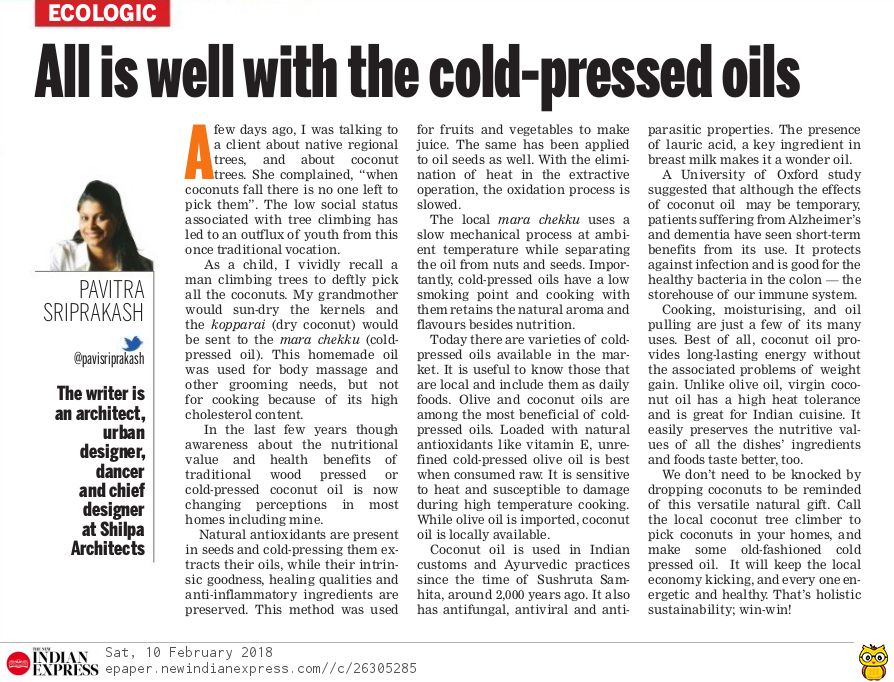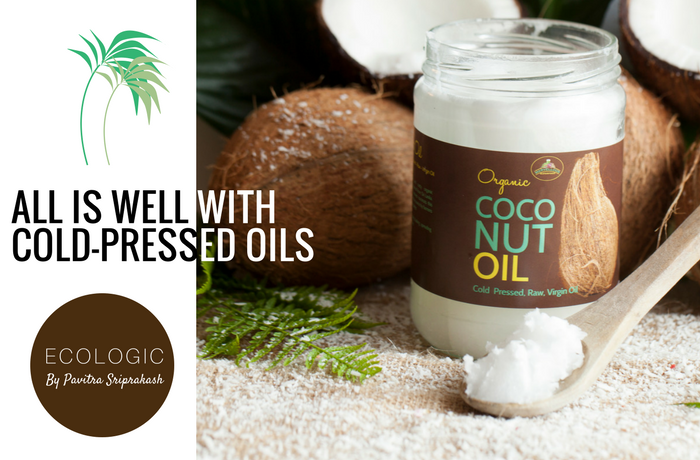February 10th 2018, New Indian Express: ECOLOGIC- Pavitra Sriprakash, the Chief Designer and Director of Shilpa Architects writes on the value of using cold-pressed natural oils such as coconut and olive oil.
Full Article
A few days ago, I was talking to a client about native regional trees, and about coconut trees. She complained, “when coconuts fall there is no one left to pick them”. The low social status associated with tree climbing has led to an outflux of youth from this once traditional vocation.
As a child, I vividly recall a man climbing trees to deftly pick all the coconuts. My grandmother would sun-dry the kernels and the kopparai (dry coconut) would be sent to the mara chekku (cold-pressed oil). This homemade oil was used for body massage and other grooming needs, but not for cooking because of its high cholesterol content.

In the last few years awareness about the nutritional value and health benefits of traditional wood pressed or cold-pressed coconut oil is now changing perceptions in most homes including mine.
Natural antioxidants are present in seeds and cold-pressing them extracts their oils, while their intrinsic goodness, healing qualities and anti-inflammatory ingredients are preserved. This method was used for fruits and vegetables to make juice. The same has been applied to oil seeds as well. With the elimination of heat in the extractive operation, the oxidation process is slowed.
The local mara chekku uses a slow mechanical process at ambient temperature while separating the oil from nuts and seeds. Importantly, cold-pressed oils have a low smoking point and cooking with them retains the natural aroma and flavours besides nutrition.
Today there are varieties of cold-pressed oils available in the market. It is useful to know those that are local and include them as daily foods. Olive and coconut oils are among the most beneficial of cold-pressed oils. Loaded with natural antioxidants like vitamin E, unrefined cold-pressed olive oil is best when consumed raw. It is sensitive to heat and susceptible to damage during high temperature cooking. While olive oil is imported, coconut oil is locally available.
Coconut oil is used in Indian customs and Ayurvedic practices since the time of Sushruta Samhita, around 2,000 years ago. It also has antifungal, antiviral and antiparasitic properties. The presence of lauric acid, a key ingredient in breast milk makes it a wonder oil.
A University of Oxford study suggested that although the effects of coconut oil may be temporary, patients suffering from Alzheimer’s and dementia have seen short-term benefits from its use. It protects against infection and is good for the healthy bacteria in the colon — the storehouse of our immune system.
Cooking, moisturising, and oil pulling are just a few of its many uses. Best of all, coconut oil provides long-lasting energy without the associated problems of weight gain. Unlike olive oil, virgin coconut oil has a high heat tolerance and is great for Indian cuisine. It easily preserves the nutritive values of all the dishes’ ingredients and foods taste better, too.
We don’t need to be knocked by dropping coconuts to be reminded of this versatile natural gift. Call the local coconut tree climber to pick coconuts in your homes, and make some old-fashioned cold pressed oil. It will keep the local economy kicking, and every one energetic and healthy. That’s holistic sustainability; win-win!
About the author
Pavitra Sriprakash (@pavisriprakash), the Director and Chief Designer of Shilpa Architects, is an Architectt, Urban Designer, Dancer and Artist. She writes a weekly sustainability column for The New Indian Express titled ECOLOGIC.



